In this article:
A cold during the summer! Sounds a bit paradoxical, doesn’t it? Or so we’d like to believe. The general perception that the weather outside has to be cold for us to catch a cold has reached near mythical proportions.
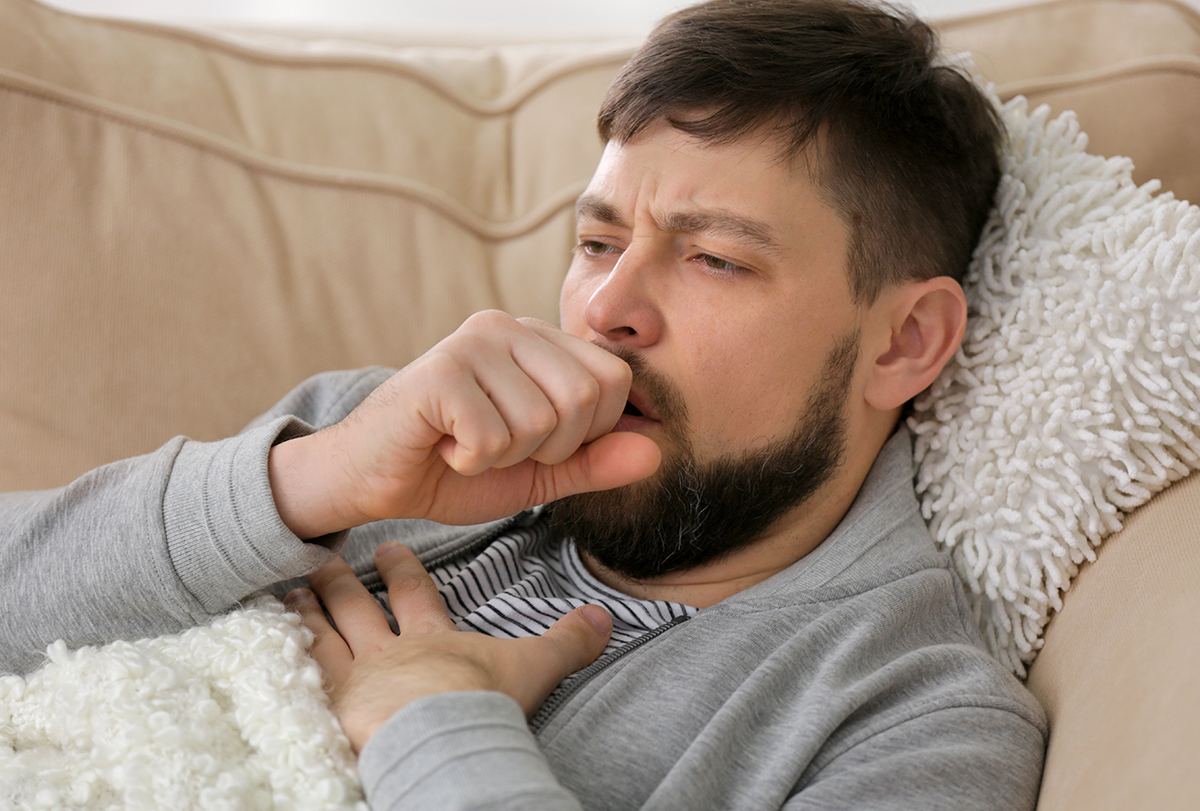
Nobody wants to entertain the idea of having their summer treats and retreats like ice cream, cold drinks, and a trip to the chilly terrains rendered off-limits.
So, we conveniently forget that unlike most of us, the viruses responsible for common cold don’t take a summer break and can strike our respiratory tract even as the temperatures soar.
Simple Ways to Get Rid of Summer Cold
Here are some home remedies for a summer cold.
1. Try saline rinse solution
Experts believe that a saline rinse is effective in causing the cold symptoms to subside. (1)
Saline water acts as a nasal decongestant, in that it helps to clear your sinuses by flushing away the condensed mucus from your nostrils. It also helps make your breathing easy and comfortable.
How to use:
- Add 1 teaspoon of sea salt to 1 cup of lukewarm water.
- Using a dropper, put a few drops of the solution into your nostril, one at a time with your head tilted back.
- Then, gently blow your nose to remove the excess mucus and solution.
- Use this remedy up to three times a day, but not more than that.
Note: Do not use table salt as an alternative to sea salt, because it contains certain elements that can further irritate the nasal tract.
2. Steam inhalation technique
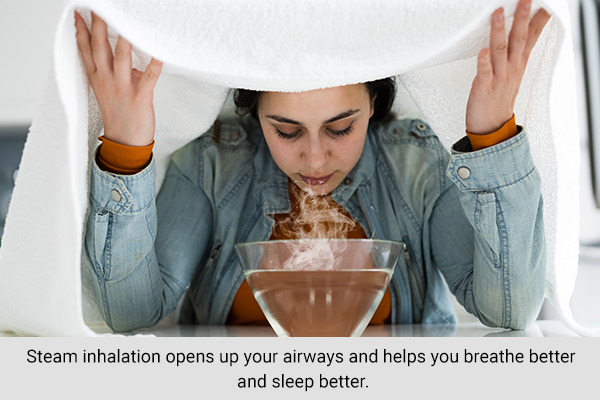
For instant relief from symptoms such as a stuffy and runny nose, scratchy throat, sore throat, and congestion, steam inhalation works like a charm. (2)
Steam inhalation opens up your airways and helps you breathe better and sleep better. This is essential for a speedy recovery as a relaxed body recuperates faster.
How to do:
- Add a few drops of eucalyptus oil or menthol to a large bowl of hot water.
- Hold your face over the bowl, with a towel over your head to trap the steam.
- Breathe in the steam for about 10 minutes, and then blow your nose.
- Repeat this process three or four times a day.
Alternatively, you can take a hot shower or bath and let the steam envelop your body to clear your stuffiness.
In addition to stimulating your immune system, eucalyptus oil comes with effective anti-inflammatory and analgesic properties that aid your breathing tract and loosen up the mucous membrane. (3)
3. A dose of ginger can help
Ginger is also beneficial in the treatment of a cold owing to its anti-inflammatory and antiviral properties that help reduce the inflammation in your nasal passages and diminish the excessive mucus that is being produced. (4)
It also keeps the body warm, which helps the healing process.
How to consume:
- Cut ginger root into thin slices, put them in a cup of water, and boil them for some time to make tea. Add a little honey for taste and drink the tea three or four times a day.
- Chewing small prices of raw ginger sprinkled with salt several times a day can alleviate a runny nose or a sore throat.
- Ginger can also be taken in the form of lozenges to get relief from the symptoms.
4. Garlic can give you easy relief
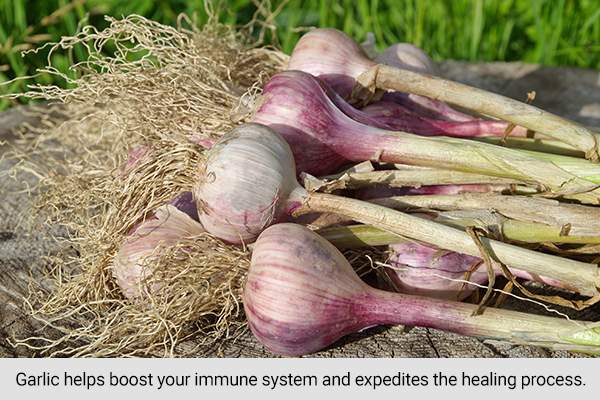
Being antibacterial and antiviral in nature, garlic helps boost your immune system and expedites the healing process. The antiviral goodness of garlic stems from a compound by the name of allicin present in it.
According to a 2001 study published in Advances in Therapies, an allicin-containing supplement is effective in shielding you from the common cold virus and can help in shortening the duration of the cold. (5)
Moreover, a 2016 study published in the Journal of Nutrition suggests that aged garlic extract supplementation may enhance immune cell function and may be partly responsible for the reduced severity of colds and flu. (6)
How to consume:
- Blend together 1 garlic clove, 2 teaspoons of fresh lemon juice, 1 teaspoon of raw honey, and ½ teaspoon of cayenne pepper. Drink this concoction once daily until the symptoms subside.
- Alternatively, prepare garlic soup by boiling 3 or 4 cloves of chopped garlic in 1 cup of water for several minutes. Strain the solution, add some honey, and drink the soup twice a day.
- Garlic supplements can also be taken on a regular basis to prevent a cold.
5. Increase your vitamin C intake
When in the throes of a viral infection, taking vitamin C can be beneficial as it triggers the body’s immune system into overdrive. It also aids the process of body tissue repair and provides antioxidants that help fight summer colds and other viral infections.
The most convincing evidence to date comes from a 2013 review of 29 randomized trials with more than 11,000 participants. Researchers found that among extremely active people-such as marathon runners, skiers, and army troops doing heavy exercise in subarctic conditions-taking at least 200 mg of vitamin C every day appeared to have minimized their risk of catching a cold to half. (7)
However, it must be noted that these results do not apply to the general population.
How to consume:
- To naturally increase vitamin C content in your diet, binge on oranges, lemons, grapefruit, papayas, red bell peppers, broccoli, kale, and strawberries, which are laden with its healthy goodness.
- You can even include a vitamin C supplement in your diet, but only after consulting your doctor.
6. Trust the healing potential of honey

Honey is another effective home treatment for a cold and cough.
It is antimicrobial in nature and contains compounds that kill the cold-inducing viruses. It also has anti-inflammatory properties, which help soothe an irritated throat and shorten the duration of a cold.
How to consume:
- Mix 2 teaspoons of raw honey with 1 teaspoon of lemon juice or ginger juice. Have it two or three times a day.
- Alternatively, you can simply swallow a spoonful of raw honey. This is advisable especially before going to bed, as it provides relief from incessant coughing and helps you sleep like a baby.
Note: Do not give raw honey to children under age 1.
7. A glass of turmeric milk
Turmeric is a panacea for fixing various ills, including a summer cold. (8)
It boasts excellent antimicrobial and anti-inflammatory properties that help reduce inflammation and promote a quick recovery from a sore throat and nasal inflammation in particular and viral infections in general.
How to consume:
- Add 1 teaspoon of turmeric powder and a little crushed black pepper to 1 glass of warm milk. Drink this twice daily.
- Alternatively, you can add ½ teaspoon of turmeric powder and ½ teaspoon of salt to 1 glass of warm water and mix it well. Gargle with this mixture twice daily to get relief from a sore throat.
8. Up your fluid intake
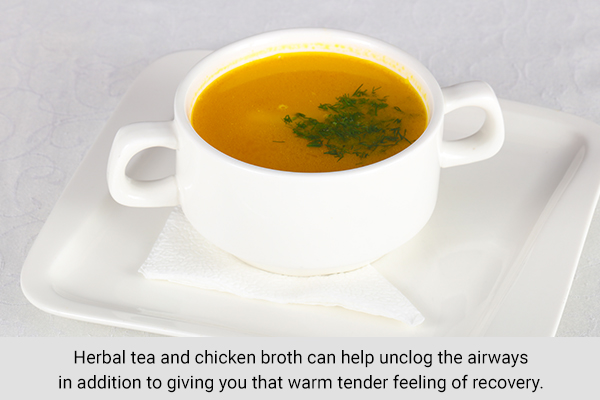
Your immune system will only function at its optimum when your body is well hydrated. So, pack in the fluids as much as you can.
Proper intake of water along with juices, coconut water, fruits, and vegetables helps the body detoxify. Herbal tea and chicken broth can also help unclog the airways in addition to giving you that warm tender feeling of recovery. (9)
It is better to steer clear of caffeinated beverages such as alcohol and coffee, as they tend to dry out your system. Drinks with a high sugar content such as soft drinks must be avoided as well.
Causes of Summer Cold
There are 200 different varieties of viruses that can trigger the wretched cold.
Unlike the winter colds that are predominantly transmitted by the rhinoviruses, a case of summer sniffles is usually associated with another group of viruses known as the enteroviruses. (10)
The non-polio enteroviruses tend to attack the nose and throat tissue, eyes, and skin as well as the digestive, respiratory, and central nervous systems. Because adults often develop immunity from these viruses from previous exposure, children are far more susceptible to fall prey to them.
The mode of transmission for the enterovirus is through respiratory secretions such as mucus and saliva as well as via the fecal excrement of an infected person.
The following factors can increase the risk of contracting the enterovirus:
- A rigorous workout session might seem like a bright idea to fight off the infection that is putting a damper on your summer plans, but it’s not. Going outdoors and putting your body through the added physical strain will only make it more vulnerable to the enterovirus.
- A long flight is the perfect breeding ground for these kinds of infections, with every fellow passenger being a potential carrier of the virus. The longer the flight, the greater your chances of catching the bug. Plus, the confined space only makes matters worse.
- Traveling to foreign locations increases your chances of coming in contact with new viruses, the kind you may not have been exposed to before and thus have no immunity against.
- Stress greatly enhances your chances of catching a cold as it tends to suppress your immune system, thereby giving the virus the opportunity to enter your system. Summer holidays can be a double-edged sword in this regard. Along with being the highlight of your summer, they can be a headache when it comes to making plans on travel arrangements and dealing with security concerns.
- Prolonged exposure to air conditioning sucks away the moisture from the mucus which is responsible for keeping the virus at bay. This gives the virus-free rein to enter and lodge into your system.
People often contract the enterovirus by:
- Skin-to-skin contact with an infected person
- Handling the feces or changing the diaper of an infected baby
- Drinking water that has been contaminated with it
- Coming in contact with a contaminated surface or item, such as a doorknob, telephone, or personal belongings of an infected person
Signs and Symptoms of Summer Cold

A summer cold is characterized by the following symptoms:
- Dry hacking coughs
- Congestion
- Scratchy/sore throat
- Nasal discharge
- Feelings of exhaustion and weariness
- Headaches
- Watery eyes
A common folly is to brush off a visit by the cold-inducing viruses as a simple case of your summer allergies acting up. Given the similarity in their symptoms, it’s hard to tell the two conditions apart but it is imperative to know the difference just the same.
Difference Between Summer Cold and Allergy
- Cold symptoms generally resolve within a week or two, but if the symptoms stick around longer than two weeks, it’s probably an allergy.
- Cold symptoms oscillate from mild to intense and then back to mild until they finally disappear, whereas allergies are much more consistent and last as long as you are exposed to the item causing it, such as pollen or dust.
- In the case of colds, the symptoms set in gradually. Allergies, however, are characterized by all the symptoms manifesting at once.
- Bloodshot and puffy eyes are a giveaway for allergies. Meanwhile, dryness and pain in the eyes are associated with a cold.
- The nasal discharge resulting from a cold tends to be thicker and more discolored. While the mucus associated with allergies is usually watery and translucent.
- A summer cold may also give rise to a fever or muscle pain, which is not the case with allergies.
- If your symptoms tend to improve or worsen with a change in environment, it is most likely to be an allergy.
It goes without saying that figuring out the root of your problem comes foremost before you can effectively go about fixing it.
Preventing Summer Cold
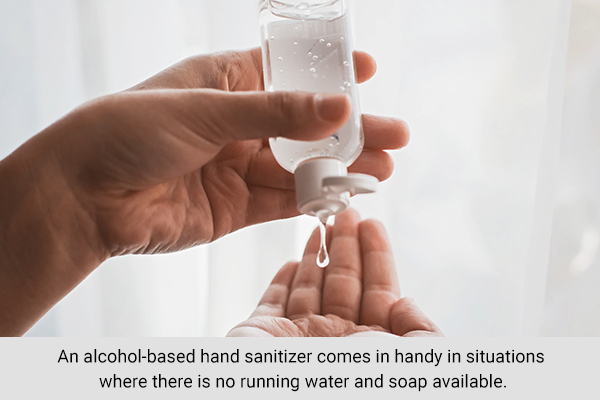
- Hand hygiene is paramount in warding off infections. Not only does it reduce the chance of catching the virus via contact with an infected person or object, but it also greatly diminishes the chances of a recurrence if you’ve already contracted the disease. Thus, wash your hands thoroughly and frequently.
- An alcohol-based hand sanitizer comes in handy in situations where there is no running water and soap available. Keep one at your disposal, at all times.
- Avoid crowded places where the likelihood of running into an infected person is far greater.
- Avoid touching your face, especially around the nose, mouth, and eyes, as much as possible when you are in a public area.
- Avoid exerting your body too much through intense physical activity.
- Because the enterovirus is transmitted via contact with body secretions, it is best to avoid proximity with infected people and their surroundings.
- Avoid stressful situations as it tends to compromise your immune system, making you easy prey for viruses.
Additional Tips to Deal With a Summer Cold
- Consider taking supplements that contain immune-boosting herbs and nutrients, but only after consulting your doctor.
- Get plenty of sleep to help the immune system function properly.
- If you have a cold, avoid going out in public areas.
- Drink homemade chicken soup. The antioxidants in it help accelerate the healing process.
- Using a humidifier or diffuser can help with congestion and open up your airways. For best results, add some eucalyptus, peppermint, or rosemary essential oil to it.
- Eat foods that fight stuffiness and nasal congestion, such as horseradish, garlic, and cayenne pepper.
- Get proper rest to give your body the time it needs to fight off the virus.
When to See a Doctor
If you run a high fever and just can’t seem to shake it off or you develop rashes, it is prudent to consult your doctor immediately.
Expert Answers (Q&A)
Answered by Dr. Daquesha C. Chever, DO (Family Physician)

Let’s face it; getting a summer cold is not fun. However, you don’t have to suffer. Just because a summer cold can be miserable doesn’t mean you have to feel miserable. There are over-the-counter medications (OTCs) that can be taken to decrease symptoms to get you feeling better quicker.
Did you know that antihistamines such as Claritin, Zyrtec, and Allegra which are used to combat seasonal allergies can also be taken when you have a summer cold? These medicines help reduce sneezing, watery eyes, runny nose, and that tickle in the back of your throat caused by postnasal drip.
Also, using nasal saline rinse and medicated nose spray such as Flonase can keep the nasal passages clean and open, allowing you to breathe better. There are plenty of natural therapies that can help alleviate cold symptoms such as honey and natural cough drops for cough, gargling with warm salt water for sore throat, and adding garlic or turmeric to hot teas and soups, just to name a few.
You’ll always want to check with your doctor before taking any OTC medications, especially if you have high blood pressure or are taking any other prescription medications.
Yes, your immune system makes antibodies while you’re sick, therefore producing the body’s natural first-line defense when faced with another infection in the future. So getting a summer cold, as annoying as it is, does actually have a benefit.
To help your immune system fight off the common cold virus, you will want to stock up on foods and beverages that are known to contain antioxidants which can help defend your body and protect your cells from free radicals produced while you’re sick.
Some examples of such foods are dark leafy greens such as kale and spinach, blueberries, cranberries, strawberries, blackberries, red grapes, watermelons, pomegranates, goji berries, oranges, carrots, mangoes, nuts, sunflower seeds, legumes, and bell peppers.
1. Get plenty of regular sleep. Bedtime routines aren’t just for kids.
2. Exercise daily even if it’s just walking for 30 minutes each day.
3. Stay hydrated, be sure to consume at least 3.7 liters (15.5 cups) of fluids a day for men and 2.7 liters (11.5 cups) of fluids a day for women.
4. Be sure to include a few antioxidant-rich foods at every meal.
5. Go outside! The natural sunlight and fresh air are relaxing and can naturally relieve stress while getting some vitamin D.
6. Wash your hands frequently and when you can’t get to an actual sink, then use hand sanitizer.
7. Limit alcohol and caffeine intake, which can lead to dehydration, poor sleep, and decreased energy.
8. Avoid crowded concerts, airports, and places with high traffic where germs spread easily. Wear a mask in these places if you are known to have a lower or weak immune system.
9. Take mental breaks throughout the day or set aside time to meditate, journal, or pray in order to decrease anxiety and stress.
10. Laughter is the best medicine. Laughing decreases stress hormones and increases the body’s natural feel-good hormones called endorphins. So, go ahead and crack some jokes!
Final Word
As soon as you start feeling unwell, you will want to slow down your daily activities to rest. Proper sleep is necessary for your immune system to work properly. You should increase your daily intake of water to make sure you’re adequately hydrated as well.
Water can help loosen mucus congestion, lubricate a sore or scratchy throat, and help rid your body of viral toxins. Make sure you have plenty of Kleenex and hand sanitizer around to decrease the chances of spreading your summer cold to your family and coworkers.
Try always to remember to cough and sneeze into your elbow and wash your hands frequently.
- Was this article helpful?
- YES, THANKS!NOT REALLY


